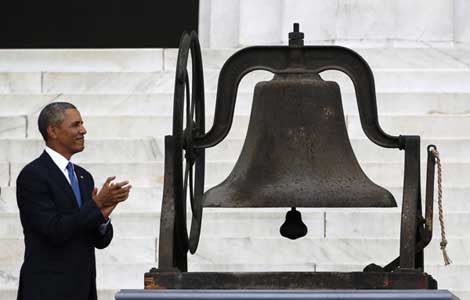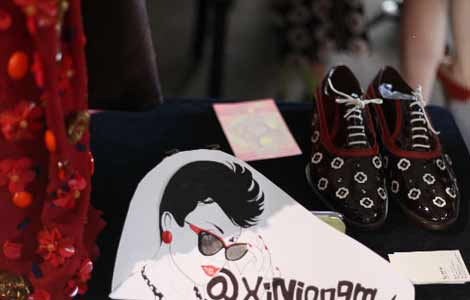More students to study overseas
Updated: 2013-08-27 23:46
By WANG HONGYI in Shanghai (China Daily)
|
||||||||
China's top universities, which once had students and parents scrambling for admission, are experiencing an embarrassing downturn in applications in the face of growing competition from overseas.
According to a recent survey by Chinese education consulting company MyCOS, the proportion of mainland students applying for top universities, such as Peking University, Tsinghua University in Beijing and Fudan University in Shanghai, is on a downward trend.
Between June 28 and July 30, MyCOS conducted an online survey of 492 students who have already received offers from universities for 2013. About 4 percent of those surveyed said they have turned down offers from the country's top universities, about 1 percentage point higher than last year.
About 3 percent said they are still considering their options.
One explanation given for the trend is the increasing lure of overseas universities, such as in Hong Kong and Macao, which appear to be attracting larger numbers of the mainland's top students.
About 93 percent of those surveyed said they will apply at the top universities on the Chinese mainland, compared with 97 percent in 2012.
As early as in 2002, universities in Hong Kong and Macao began to enroll undergraduate students from the mainland, attracting them with high-quality educational resources, generous scholarships and bright job prospects.
This year, the number of mainland students applying at Hong Kong University hit a record high of 12,000. The university planned to enroll between 250 and 300 students from the mainland, but the number finally expanded to 303, including 16 champions of the gaokao — the mainland's college entrance exam.
According to a report by the Social Sciences Academic Press in 2012, about 340,000 Chinese students went overseas for further study in 2011. Among them a growing number of students from renowned high schools skipped the gaokao.
"It's not a total snub for domestic universities. For students and parents, this means they will have more choices. They can compare the advantages and disadvantages of domestic and overseas universities," said Ma Yan, a resident in Shanghai, whose son is in junior middle school.
"Parents often talk about sending their children to study overseas, and many choose to do that when the children are very young. I think the most important thing should be for the children to find out the best way to develop themselves, no matter what school they choose. And that is also the meaning of education," she said.
Education experts have heeded the trends shown in the survey, while some media outlets have declared that China's higher education system is heading into a decline.
Education expert Xiong Bingqi said: "Now parents and students pay more attention to the significance of the education, which is the shortcoming of domestic universities. Overseas universities generally consider the cultivation of talent and the nurturing of innovation as their core functions."
He said that domestic universities should be aware of this challenge and must seek effective reforms.
"Chinese educators should think seriously about what kind of university the country really needs," said Yu Lizhong, former president of East China Normal University and now president of New York University Shanghai.
New York University Shanghai, the first Sino-US higher-education institute, represents one bold attempt at education innovation on the Chinese mainland. It started operations this month with an enrollment of almost 300 students.
"Traditionally, students are all educated in the same way. But this approach is not adapted to the new era," said Yu. "Each student has his or her own characteristics and interests, so now the goal of education is to help students find their own way of developing."

 US vows action in Syria even without UN backing
US vows action in Syria even without UN backing
 Li Na advances to 3rd round
Li Na advances to 3rd round
 Obama, marchers mark 50 yrs since King's speech
Obama, marchers mark 50 yrs since King's speech
 Singers' son pleads not guilty
Singers' son pleads not guilty
 Rubber duck to float in Beijing
Rubber duck to float in Beijing
 New York Times, Twitter hacked by Syrian group
New York Times, Twitter hacked by Syrian group
 Five apps to help you 'breathe' in Beijing
Five apps to help you 'breathe' in Beijing
 Wozniacki survives battle with Chinese qualifier
Wozniacki survives battle with Chinese qualifier
Most Viewed
Editor's Picks

|

|

|

|

|

|
Today's Top News
China, US officials discuss defense ties
Envoy to seek release of US citizen
China leads the way on multilateral defense co-op
Bond trial program set to expand
China set to lead e-commerce market
US vows action in Syria
Firms 'must foster' jobs abroad
5-yr work plan to fight graft unveiled
US Weekly

|

|






